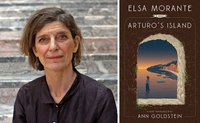Arturo’s Island
Elsa Morante, trans. from the Italian by Ann Goldstein. Liveright, $27.95 (384p) ISBN 978-1-63149-329-4
In this translation of Morante’s arresting, febrile tale of abjection and adoration, originally published in 1957, Goldstein captures the blustery voice of an adolescent boy on Procida, an island off the coast of Naples, in the years before WWII. Accustomed to “absolute solitude,” motherless Arturo lives in a dilapidated former monastery at a far remove from Procida’s “surly, taciturn” inhabitants. He abandons himself to books and rambles while awaiting his vagabond father, whom he deifies, to return from his frequent journeys. A penitentiary looms on the island’s cliffs, underscoring the imprisoning spell Procida casts on the swaggering protagonist. Arturo is obsessed with heroism and honor, and possesses a haughty disdain for women, but at his core, he is a vulnerable creature governed by half-understood yearnings and a boiling romanticism. The arrival of a stepmother, a devout 16-year-old his father brings back from Naples and one of this often brutal work’s most touching figures, inspires maternal and erotic longings, jealousy, and revulsion. The novel’s relationships are usually triangular, acute rivalries marked by “marvellous hateful attractions” and abrupt Dostoyevskian shifts from veneration to malice. Morante’s style is well-suited to the adolescent narrator who, marooned on an island, experiences particularly intense bouts of enchantment and disillusionment, making for a captivating novel. (Feb.)
Details
Reviewed on: 10/22/2018
Genre: Fiction
Compact Disc - 978-1-6651-2940-4
Compact Disc - 978-1-68441-812-1
MP3 CD - 978-1-6651-2939-8
Paperback - 386 pages - 978-1-63149-662-2
Paperback - 351 pages - 978-1-58642-041-3
Paperback - 978-1-80533-197-1


